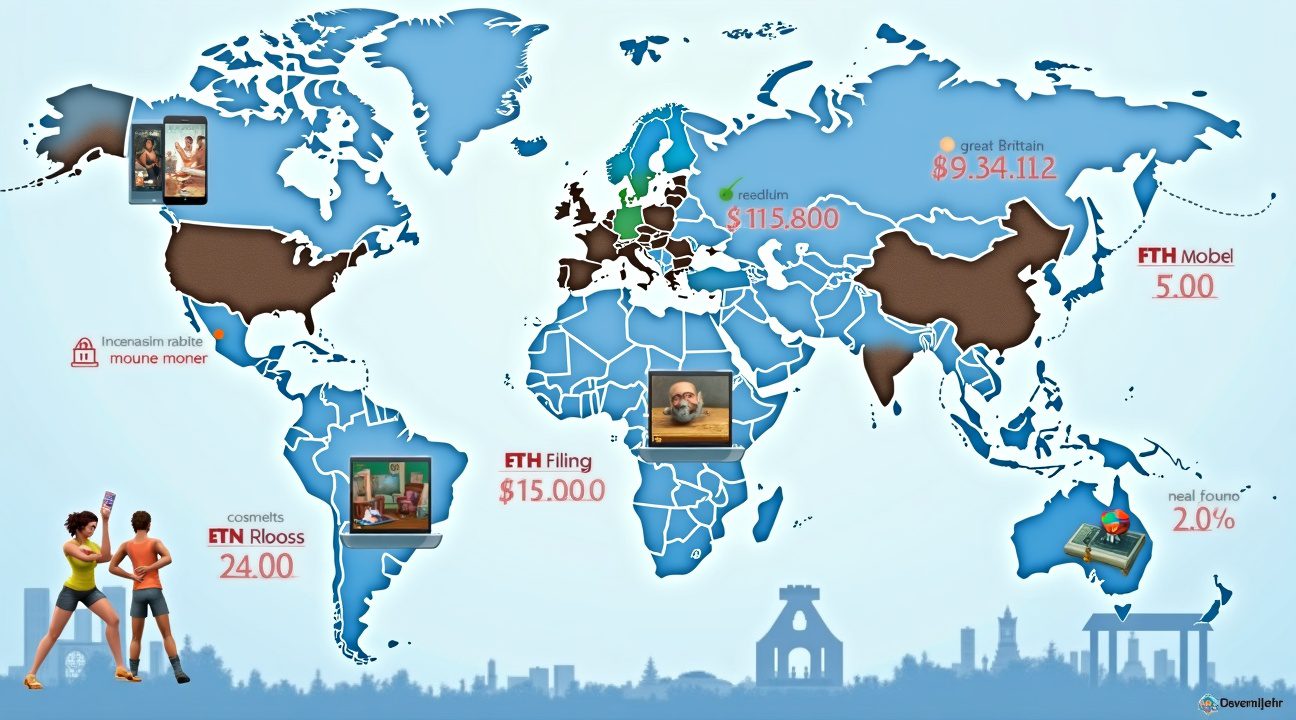Electronic Arts has officially announced that The Sims Mobile will permanently shut down on July 31, 2025, marking the end of the mobile gaming experience for fans of the franchise.
Despite generating $25 million in lifetime revenue and accumulating over 41.5 million downloads, the game failed to meet EA’s long-term profitability expectations and strategic priorities.
Key Takeaways
- Complete shutdown on July 31, 2025 – All game access, online features, and live services will become permanently inaccessible after this date.
- No compensation for purchases – Players will lose all in-game content including premium currency, exclusive items, and expansion packs without refund options.
- Strong financial performance despite closure – The game generated $25 million in revenue with 41.5 million downloads, with the United States accounting for 58% of total spending.
- Final update already released – EA has issued the last major content addition and will end technical support shortly after the shutdown announcement.
- Alternative options remain available – Players can transition to The Sims FreePlay on mobile or The Sims 4 on PC, though progress cannot be transferred between platforms.
Why EA Is Shutting Down The Sims Mobile
The shutdown decision reflects EA’s broader strategy to focus resources on more profitable ventures within their gaming portfolio. Mobile gaming markets have become increasingly competitive, forcing publishers to make difficult choices about which titles receive continued support. The Sims Mobile, launched in 2018, represented EA’s attempt to capture the life simulation audience on smartphones and tablets.
Impact on Players
Players who invested significant time and money into the game face a complete loss of their virtual assets. EA’s policy offers no refunds for previous purchases, leaving many community members frustrated with the announcement. The company has encouraged players to explore other Sims titles, though the mobile-specific features and progress won’t carry over to alternative platforms.
Revenue vs. Expectations
Revenue data shows The Sims Mobile achieved moderate success in the mobile gaming space. However, EA’s financial targets apparently required higher performance levels to justify ongoing development and server maintenance costs. The decision demonstrates how even profitable games can face closure when they don’t align with corporate strategic goals.
What Players Should Do Now
- Continue using current in-game content until July 31, 2025.
- Download or save personal creations and screenshots before shutdown.
- Try out The Sims FreePlay or The Sims 4 to continue enjoying the franchise.
Current players have approximately eight months to enjoy their existing content before servers go offline permanently. EA recommends downloading any personal creations or screenshots before the shutdown date, as recovery will be impossible afterward. The final content update has already been deployed, signaling the end of active development for the title.
EA Confirms The Sims Mobile Will Shut Down on July 31, 2025
Electronic Arts has officially announced the end of an era for mobile Sims fans. The company confirmed that The Sims Mobile will permanently shut down on July 31, 2025, bringing the mobile gaming experience to a definitive close.
The shutdown schedule leaves players with limited time to enjoy their virtual lives and digital homes. After July 31, 2025, users will completely lose access to the game and all its online features. This means no more decorating homes, building relationships, or pursuing careers within the mobile Sims universe.
Players should prepare for significant changes in the coming months. EA has already released the final update for The Sims Mobile, marking the last major content addition to the game. Support for the title will end shortly after the shutdown announcement, leaving players without technical assistance or customer service options.
What Happens to In-Game Content and Purchases
The closure affects every aspect of the gaming experience. All live services will become inaccessible once the shutdown takes effect, eliminating multiplayer interactions and social features that defined much of the mobile experience. Seasonal events, limited-time challenges, and special promotions will also disappear permanently.
In-game purchases present a particular concern for dedicated players. All purchased content, including:
- Premium currency and SimCash
- Exclusive clothing and furniture items
- Expansion packs and room additions
- Special character traits and abilities
- Seasonal cosmetics and decorations
These purchases will become completely inaccessible after the closure date. Players who invested real money in virtual content will lose access to their digital investments without compensation options from EA.
The announcement reflects broader industry trends affecting mobile gaming sustainability. Development costs, server maintenance expenses, and declining player engagement often contribute to shutdown decisions. EA’s choice to end The Sims Mobile suggests the game no longer meets profitability thresholds or strategic priorities for the company.
Current players face an emotional transition as they prepare to say goodbye to virtual families and carefully crafted homes. Many have spent years building digital lives, forming relationships with other players, and creating elaborate living spaces. The permanent nature of the shutdown means no possibility of transferring progress to other Sims titles or preserving achievements.
The gaming community has responded with mixed emotions to the closure announcement. Long-time players express disappointment about losing their progress and investments, while others view the shutdown as an opportunity to explore alternative gaming options or return to traditional PC versions of The Sims franchise.
EA hasn’t announced specific plans for data preservation or alternative gaming options for displaced mobile players. The company typically recommends exploring other titles in The Sims portfolio, though mobile-specific features and gameplay mechanics don’t translate directly to PC or console versions.
Players should consider backing up screenshots, videos, or other memorable content before the shutdown date. Once July 31, 2025 arrives, retrieving any game-related content becomes impossible. Social media platforms and cloud storage services offer ways to preserve favorite moments and achievements from The Sims Mobile experience.
The shutdown timeline provides several months for players to adjust their gaming habits and explore alternatives. However, the finality of the closure emphasizes the temporary nature of online gaming services and the importance of understanding terms of service for digital purchases.

The Sims Mobile Generated $25 Million Despite Closure Decision
Despite its impending shutdown, The Sims Mobile demonstrated remarkable financial performance throughout its operational period. The game achieved impressive commercial success that makes its closure particularly surprising for industry observers and dedicated players alike.
Download Performance and Global Reach
The Sims Mobile attracted an impressive player base during its lifetime, accumulating over 41.5 million total downloads according to Sensor Tower data. Android users dominated the download statistics, with Google Play accounting for 58% of all installations. This distribution pattern reflects typical mobile gaming trends where Android devices capture the majority of downloads due to their broader global market penetration.
The game’s appeal extended across multiple regions, demonstrating EA’s ability to localize content effectively for diverse markets. Players consistently engaged with the franchise’s signature life simulation gameplay, adapted specifically for mobile platforms with touch-friendly controls and shorter play sessions.
Revenue Distribution and Market Performance
Lifetime revenue for The Sims Mobile reached an impressive $25 million as of early 2025, showcasing the game’s monetization effectiveness through in-app purchases. The revenue breakdown reveals interesting geographical patterns that highlight key markets for mobile gaming spending.
The financial performance breakdown shows several notable trends:
- United States players contributed the largest share at 58% of total revenue, generating $14.3 million
- Great Britain represented the second-largest market with 7.9% of spending, totaling $1.97 million
- Remaining global markets collectively accounted for approximately $8.77 million
- In-app purchases drove the majority of revenue through cosmetic items, premium content, and convenience features
Even in its final months before closure announcement, The Sims Mobile maintained respectable market positions. The app ranked #320 globally for revenue generation and #148 for downloads, demonstrating sustained player interest despite the mature stage of its lifecycle. These rankings actually showed brief upticks during certain periods, suggesting that dedicated fans continued supporting the game through purchases.
The revenue performance becomes even more significant when considering the competitive mobile gaming landscape. Achieving $25 million in lifetime revenue places The Sims Mobile among successful mobile adaptations of established franchises, though it ultimately fell short of EA’s long-term expectations for continued operation.
Player spending patterns indicate that The Sims Mobile successfully converted free-to-play users into paying customers through carefully designed monetization systems. The game offered various cosmetic upgrades, furniture collections, and progression accelerators that appealed to fans of the broader Sims franchise while respecting mobile gaming conventions.
The geographic distribution of spending also reflects broader mobile gaming economics, where Western markets typically generate higher per-user revenue despite potentially smaller download volumes compared to emerging markets. The United States’ dominant 58% revenue share aligns with industry patterns where American players demonstrate higher willingness to spend on mobile entertainment.
These financial achievements make The Sims Mobile‘s closure decision particularly noteworthy within the mobile gaming industry. The game clearly found its audience and maintained steady revenue streams, yet EA’s strategic priorities shifted away from continuing development and support for this particular mobile iteration of their beloved franchise.

How The Sims Mobile Compares to Other Franchise Titles
The Sims Mobile’s upcoming closure stands in stark contrast to the broader franchise’s remarkable success story. The Sims franchise as a whole boasts 80 million active players worldwide, establishing itself as one of the most successful video game series globally. This massive player base demonstrates the enduring appeal of life simulation gaming across multiple platforms and generations.
The Franchise’s Peak Performance
The most successful entry in the series was The Sims Social, a Facebook-based game that reached extraordinary heights during the social gaming boom. This title peaked at 100 million registered players, surpassing even FarmVille’s impressive 83 million users. The social platform integration proved to be a winning formula, allowing players to connect their virtual lives with real-world friendships in ways that traditional Sims games couldn’t match.
The Sims 4 continues to demonstrate the franchise’s staying power on PC and console platforms. With over 10 million currently active players and more than 36 million unique players since launch, it remains a powerhouse in the simulation genre. Regular content updates, expansion packs, and community-driven modifications keep the player base engaged and growing, showing how the core Sims experience thrives when given proper development resources and platform stability.
Mobile Gaming Alternatives
For mobile fans facing The Sims Mobile’s closure, The Sims FreePlay offers a compelling alternative that isn’t shutting down. This mobile title has maintained its position in the market by focusing on long-term gameplay progression and city-building elements that work well on touchscreen devices. The game’s freemium model has proven sustainable, unlike The Sims Mobile’s apparent struggles with monetization and player retention.
The contrast between these titles highlights how different approaches to mobile gaming can yield vastly different results.
- The Sims Mobile attempted to bring a more console-like experience to smartphones.
- The Sims FreePlay embraced mobile-specific gameplay mechanics from the start.
This fundamental difference in design philosophy may explain why one continues to thrive while the other faces closure.
The broader franchise’s success across multiple platforms demonstrates that The Sims concept remains incredibly popular. The 80 million active players across all titles prove that demand for life simulation gaming hasn’t diminished. However, the mobile market requires specific adaptations that not every franchise entry successfully achieves. The Sims Mobile’s closure doesn’t reflect poorly on the franchise itself but rather illustrates the challenges of adapting beloved gameplay formulas to mobile platforms.
Players who enjoyed The Sims Mobile can take comfort in knowing that the franchise continues to flourish elsewhere. The PC version of The Sims 4 receives regular updates and maintains a vibrant community, while The Sims FreePlay provides ongoing mobile entertainment. The series’ overall health suggests that future mobile attempts might learn from The Sims Mobile’s challenges and create more sustainable experiences for smartphone users.
What Players Are Saying About The Sims Mobile’s End
The announcement of The Sims Mobile’s closure has sparked an outpouring of emotions from its dedicated community. Players who spent years building virtual lives and forming connections through social simulation features have taken to social media platforms and gaming forums to express their disappointment and share memories of their mobile gaming experiences.
Community Reactions and Memories
Long-time players have been particularly vocal about losing the unique social aspects that set The Sims Mobile apart from other mobile games. Many community members highlight how the game’s focus on player interactions, customizable avatars, and collaborative in-game events created lasting friendships that extended beyond the virtual environment. The ability to visit other players’ homes, participate in social gatherings, and engage in multiplayer activities fostered a sense of belonging that players found difficult to replicate elsewhere.
Fans have been organizing farewell parties within the game, hosting final events, and creating tribute content to commemorate their shared experiences. The Sims community has always been known for its creativity, and this transition period has showcased that spirit through fan art, video montages, and detailed accounts of memorable gameplay moments. Players frequently mention how the mobile version allowed them to experience The Sims franchise in short bursts throughout their day, making it an ideal companion for busy lifestyles.
Transition Concerns and Developer Response
The gaming community has expressed mixed feelings about the developers’ suggestions to migrate to other Sims titles. While some players appreciate the farewell content and retrospective materials that have been released, others worry about starting over after investing significant time and sometimes money into their mobile progress. The transition from mobile-specific features to traditional PC or console gameplay represents a substantial shift that not all players feel prepared to make.
Community feedback reveals that many players valued The Sims Mobile’s accessibility and unique mobile-optimized features that won’t translate directly to other platforms. The convenience of playing during commutes, lunch breaks, or brief free moments made the mobile version irreplaceable for certain segments of the player base. Despite these concerns, veteran Sims community members have been organizing support networks to help newcomers adjust to different versions of the franchise.
The mobile legacy that The Sims Mobile leaves behind includes innovations in touch-based controls, streamlined social features, and event-driven gameplay that influenced how players engage with simulation games on mobile devices. Though it couldn’t match the sustained success of The Sims FreePlay or achieve the cultural impact of the main PC releases, the game carved out its own space in the mobile gaming landscape and created meaningful experiences for its dedicated player base.
The Sims 4 Continues Strong Performance Despite Mobile Shutdown
While The Sims Mobile prepares for its final curtain call, the franchise’s flagship title demonstrates remarkable resilience and continued growth. The Sims 4 maintains its position as a powerhouse in PC gaming, securing the 4th spot among the most-played PC games in February 2025. This impressive ranking showcases the enduring appeal of the life simulation genre and EA’s commitment to supporting their core gaming experience.
The numbers tell a compelling story of sustained engagement. The Sims 4‘s live player base consistently maintains over 30,000 concurrent users during peak hours, reflecting a dedicated community that refuses to let go of their virtual lives. These figures represent more than casual gaming sessions – they demonstrate deep player investment in the creative possibilities that The Sims 4 offers through its comprehensive building tools, character customization, and storytelling mechanics.
EA’s continued investment in The Sims 4 reveals their strategic focus on quality over quantity. Rather than spreading resources thin across multiple platforms, the company channels development efforts into enriching the PC experience with regular content updates, expansion packs, and seasonal events. Recent expansions have introduced new gameplay mechanics, career paths, and world-building opportunities that keep longtime players engaged while attracting newcomers to the franchise.
Sustained Content Strategy Drives Player Retention
The publisher’s approach to content delivery has evolved to meet modern gaming expectations:
- Monthly updates introduce bug fixes, quality-of-life improvements, and seasonal content that keeps the game feeling fresh.
- Major expansion releases often trend on social media and drive spikes in player acquisition.
- Live events offer time-limited experiences that foster regular logins and shared global gameplay moments.
Live events represent another crucial element in maintaining player engagement. These time-limited activities encourage regular login habits and create shared experiences across the global player base. From holiday celebrations to community challenges, these events foster a sense of collective participation that strengthens the game’s social fabric.
Player-generated content remains a cornerstone of The Sims 4‘s longevity. The Gallery feature enables users to share their creations with millions of players worldwide, creating an endless stream of fresh content without additional development costs. This user-generated ecosystem has produced everything from celebrity recreations to architectural marvels, extending the game’s replay value indefinitely.
The contrast between The Sims Mobile‘s closure and The Sims 4‘s thriving state highlights the importance of platform selection and monetization strategies. While mobile gaming offers broader accessibility, the PC platform provides the technical capabilities necessary for the complex simulation mechanics that define the franchise. The Sims 4‘s success validates EA’s decision to prioritize depth over breadth in their gaming portfolio.
Looking ahead, the franchise’s future appears secure with The Sims 4 as its foundation. The game’s modding community continues to expand its possibilities through custom content, while EA’s official support ensures stability and new features. This combination of community creativity and corporate backing creates a sustainable ecosystem that can weather industry changes and platform transitions.
The transition away from mobile gaming allows EA to concentrate resources on what works best for the franchise. The Sims 4‘s performance metrics demonstrate that players value comprehensive gameplay experiences over simplified mobile alternatives. This lesson will likely influence future development decisions as the company evaluates new platform opportunities and franchise extensions.
For more about The Sims 4 and official updates, visit The Sims 4 official page.
https://www.youtube.com/watch?v=Z00mK3Pxc8w

Sources:
The Sims Tree, “The Sims Mobile Is Shutting Down: Final Update, Dates, and What’s Next”
Sensor Tower via State of AI Apps Report 2025, “EA’s Seen $25 Million in The Sims Mobile Revenue So Far”
LEVVVEL, “How many people play The Sims? — 2025 statistics”
Sims Community, “The Sims 4 charts report Feb25”
ActivePlayer.io, “The Sims 4 Live Player Count and Statistics”
PlayTracker, “The Sims™ FreePlay stats, graphs, and player estimates”

